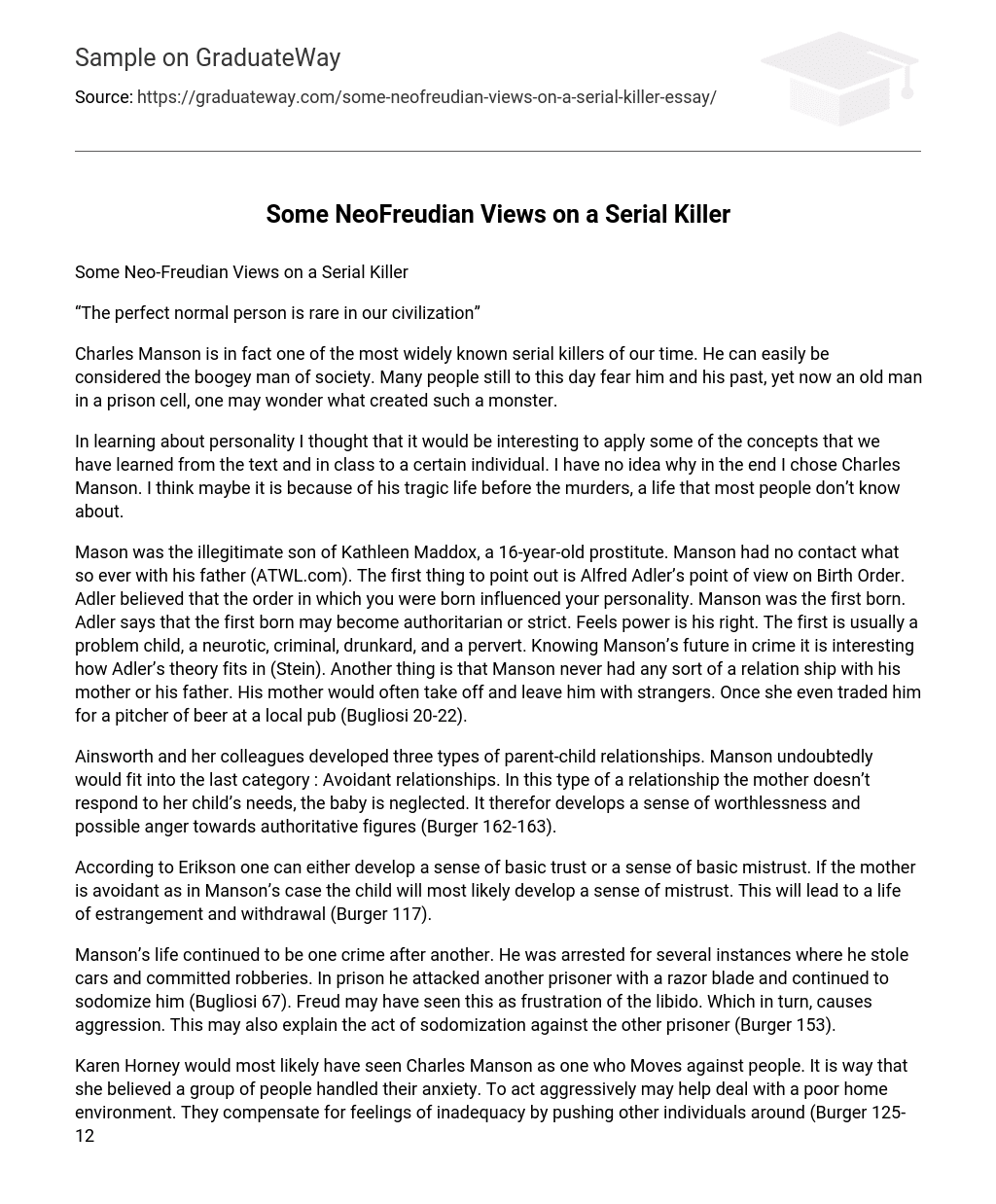Some Neo-Freudian Views on a Serial Killer
“In our civilization, it is rare to find the perfect normal person.”
Charles Manson, widely recognized as one of the most notorious serial killers of our era, is often referred to as society’s boogeyman. Despite his advanced age and current imprisonment, he continues to inspire fear and curiosity. The question remains: what factors contributed to the creation of this monstrous individual?
In studying personality, I found it intriguing to analyze an individual’s traits using the concepts we learned in the class and textbook. Surprisingly, I decided to focus on Charles Manson, possibly due to his lesser-known tragic life prior to the infamous murders.
Mason was the illegitimate son of Kathleen Maddox, a 16-year-old prostitute, and he had no contact whatsoever with his father (ATWL.com). According to Alfred Adler’s perspective on Birth Order, Manson being the firstborn influenced his personality. Adler states that the firstborn may develop authoritarian or strict tendencies, feeling entitled to power. Typically, the firstborn is a problematic child and may become neurotic, criminal, alcoholic, or perverse. It is intriguing how Manson’s future in crime aligns with Adler’s theory (Stein). Additionally, Manson had no relationship with either his mother or father. His mother frequently abandoned him and even once traded him for a pitcher of beer at a local pub (Bugliosi 20-22).
Ainsworth and her colleagues introduced three types of parent-child relationships, with Manson being classified in the Avoidant relationship category. In this category, the mother fails to meet the child’s needs, resulting in neglect. Consequently, the child develops feelings of worthlessness and potential anger towards authority figures (Burger 162-163).
Erikson explains that individuals have the choice to develop either a sense of basic trust or a sense of basic mistrust. In cases like Manson’s, where the mother is avoidant, the child tends to develop a sense of mistrust. Consequently, this can result in a life characterized by estrangement and withdrawal (Burger 117).
Throughout Manson’s life, he was constantly involved in criminal activities. He was apprehended multiple times for car theft and robberies. While serving time in prison, he viciously assaulted a fellow inmate using a razor blade and subjected him to forced anal intercourse (Bugliosi 67). In Freud’s perspective, such aggressive behavior could be attributed to a repressed libido, leading to frustration and subsequently causing aggression. This theory may also elucidate the motive behind Manson’s act of sodomizing the other prisoner (Burger 153).
Karen Horney would probably have interpreted Charles Manson as someone who Moves against people, a way she believed some individuals cope with their anxiety. Acting aggressively can be a response to a difficult home environment and can be a way to compensate for feelings of inadequacy by exerting control over others (Burger 125-125). During the summer of love, Manson attracted individuals who were similar to him in many aspects. In fact, many of the girls who became acquainted with Manson saw him as a Father figure and engaged in sexual relationships with him. He was known as the leader of the cult (Bugliosi 111-125). Freud may have observed a similarity to the Oedipus complex in this situation. The Oedipus complex is based on a mythological character who unknowingly married his mother. Though not biologically related, Freud may argue that they sought a father figure in their lives (Donadio).
Manson’s rule can be described as authoritarian. Throughout his time leading the cult, he manipulated and convinced his followers that he possessed god-like qualities. Additionally, he compelled them to engage in a horrific killing spree. According to Erich Fromm, this behavior represents the inclination to merge oneself with external entities in order to compensate for personal weaknesses (Fromm, p.163). Fromm further states, “I believe that Evilness and self-loss are just as tangible as goodness and liveliness. They are alternative potentials within man if he chooses not to embrace his primary potentials” (Fromm 145-152).
Fromm posited that individuals are either born as saints or as criminals, with most of us having both good and evil dispositions to varying degrees. Thus, our destiny is largely shaped by the influences that mold these dispositions. Fromm emphasized the significance of the family as the primary influence, but noted that the family itself is essentially an agent of society, conveying the values and norms that a society wishes to instill in its members. Consequently, the structure and values of the society into which an individual is born are deemed as the most crucial factors in their personal development (Fromm 165-166).
Understanding Manson’s upbringing, Fromm’s words can provide a plausible explanation for Manson’s character and his present identity. While I do not justify the crimes he committed due to his early life, exploring neo-Freudian concepts in relation to his individuality seemed intriguing to me.
WORKS CITED
Buglisio, Vincent, and Curt Gentry authored Helter Skelter: The True Story of the Manson Murders, published by Bantam Books in 1995.
Burger, Jerry M. Personality fifth Edition. Stamford, CT. Wadsworth, 2000
Donadio, James J.’s website, “The Unofficial Online Home of Sigmund Freud,” can be found at http://talk.to/freud. The website was last accessed on 3/14/00.
Fromm, Erich. Beyond the Chains of Illusions. New York: Simon and Schuster, 1962.
Good, Sandra. Access Freud. Available: http://www.atwa.com 3/14/00
Stein, Harry T. Ph.D. provides an Adlerian overview of Birth Order Characteristics. The information is available at:
http://ourworld.compuserve.com/homepages/hstein/birthord.htm. The source was accessed on 3/14/00.





